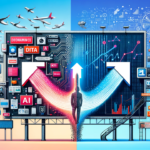
Understanding Machine Learning and Its Role in Marketing
December 27, 2024
The Evolution of Marketing: From Traditional to AI-Powered Approaches
December 30, 2024
In the fast-evolving world of technology, few innovations have had as profound an impact as machine learning (ML). This subset of artificial intelligence (AI) is no longer confined to tech labs; it has become an indispensable tool across industries, and marketing is one of the most exciting arenas where its potential is being realized.
In marketing, where understanding customer behavior and delivering tailored experiences are paramount, machine learning has proven to be a game-changer. From improving customer segmentation to predicting purchasing behavior, ML is reshaping how brands engage with their audiences and optimize strategies.
This blog delves into the concept of machine learning, explores its transformational role in marketing, and highlights how businesses can harness its power to stay competitive in a rapidly changing digital landscape.
What Is Machine Learning?
At its core, machine learning is a form of AI that enables systems to learn from data and improve their performance over time without being explicitly programmed. Rather than following rigid, pre-defined rules, machine learning algorithms analyze patterns, identify trends, and make predictions or decisions based on data inputs.
There are three primary types of machine learning:
- Supervised Learning: Algorithms are trained using labeled data, where the input and desired output are provided. For example, predicting customer churn based on past behavior.
- Unsupervised Learning: Algorithms work with unlabeled data to identify hidden patterns or groupings, such as customer segmentation.
- Reinforcement Learning: Algorithms learn by interacting with an environment and receiving feedback (rewards or penalties) to optimize actions, often used in dynamic ad placements or pricing strategies.
In marketing, these learning types are applied to solve complex challenges, making campaigns smarter, faster, and more customer-centric.
The Role of Machine Learning in Marketing
Machine learning is revolutionizing marketing by empowering businesses to make data-driven decisions and enhance every stage of the customer journey. Here’s how:
1. Personalized Customer Experiences
In today’s world, personalization is no longer a luxury—it’s an expectation. Customers want brands to understand their needs and deliver tailored experiences. Machine learning makes this possible by analyzing massive datasets to predict what customers want and when they want it.
- Dynamic Content Recommendations: Streaming platforms like Netflix and Spotify use machine learning to suggest shows, movies, or songs based on user preferences.
- E-Commerce Personalization: Retailers leverage ML to recommend products that align with individual browsing and purchase history, boosting conversion rates.
For instance, a fashion brand can use machine learning to analyze a customer’s purchase behavior and recommend clothing styles that match their preferences, creating a bespoke shopping experience.
2. Predictive Analytics for Smarter Decision-Making
Predictive analytics, powered by machine learning, is enabling marketers to anticipate customer behavior with remarkable accuracy. This allows businesses to be proactive rather than reactive in their strategies.
- Sales Forecasting: ML models analyze historical sales data, market trends, and seasonality to predict future sales patterns, helping businesses allocate resources effectively.
- Customer Lifetime Value (CLV): Predictive analytics identifies which customers are likely to provide the highest long-term value, allowing businesses to focus retention efforts on their most valuable segments.
- Churn Prediction: ML algorithms detect early warning signs of customer dissatisfaction, enabling timely interventions to reduce churn rates.
For example, an online subscription service can predict which users are likely to cancel their memberships and offer targeted discounts or value-added features to retain them.

3. Enhanced Customer Segmentation
Traditional customer segmentation methods rely on demographic or geographic data, which can be limiting. Machine learning, however, dives deeper into customer behavior to create micro-segments that drive highly targeted marketing campaigns.
- Behavioral Clustering: Unsupervised learning algorithms group customers based on similar behaviors, such as browsing patterns, purchase frequency, or engagement levels.
- Real-Time Segmentation: ML processes real-time data to dynamically adjust segments, ensuring campaigns remain relevant as customer preferences evolve.
For example, a travel agency can use ML to identify customers interested in luxury vacations versus adventure travel and tailor their marketing messages accordingly.
4. Optimizing Marketing Campaigns
Machine learning takes the guesswork out of marketing by analyzing data to determine which strategies work best. It helps marketers fine-tune campaigns for maximum ROI.
- A/B Testing Automation: ML can automate A/B testing, analyzing multiple variables simultaneously to determine the most effective campaign elements.
- Dynamic Pricing: By analyzing market conditions, competitor pricing, and customer demand, ML helps businesses set optimal prices in real time.
- Ad Targeting: ML algorithms identify the best audience segments for ads, ensuring higher engagement and lower cost-per-click (CPC).
For instance, Google Ads uses machine learning to optimize ad placements, ensuring they appear before the right audience at the right time.
5. Chatbots and Conversational AI
Chatbots, powered by machine learning and natural language processing (NLP), are revolutionizing customer service by offering instant, intelligent responses to customer inquiries.
- 24/7 Availability: Chatbots handle customer queries around the clock, providing support without requiring human intervention.
- Contextual Understanding: Advanced ML models enable chatbots to understand the context of conversations, making interactions more natural and engaging.
- Lead Generation: Chatbots qualify leads by asking relevant questions and directing high-value prospects to sales teams.
For example, a telecom company could use an ML-powered chatbot to assist customers with troubleshooting issues, reducing wait times and improving satisfaction.
The Benefits of Machine Learning in Marketing
The advantages of integrating machine learning into marketing strategies are immense:
- Increased Efficiency: Automating repetitive tasks allows marketers to focus on strategy and creativity.
- Data-Driven Decisions: ML provides actionable insights, helping businesses make informed choices backed by data.
- Improved ROI: Targeted campaigns and optimized strategies lead to higher engagement and conversion rates.
- Scalability: ML systems can analyze vast amounts of data, making them ideal for businesses of all sizes.
Challenges in Implementing Machine Learning
While the potential of machine learning in marketing is undeniable, there are challenges to consider:
- Data Quality: Poor-quality data can lead to inaccurate predictions and suboptimal outcomes.
- Ethical Concerns: Marketers must ensure their use of ML respects customer privacy and complies with regulations like GDPR.
- Cost and Expertise: Implementing ML requires investment in technology and skilled personnel, which may be a barrier for smaller businesses.
Overcoming these challenges requires businesses to prioritize data governance, ethical practices, and upskilling teams to harness the full potential of machine learning.

The Future of Machine Learning in Marketing
As machine learning continues to evolve, its role in marketing will only grow more significant. Emerging trends include:
- Hyper-Personalization: Combining ML with real-time data to deliver experiences tailored to individual preferences.
- Voice and Visual Search: Leveraging ML to optimize content for emerging search formats.
- AI-Generated Content: Using ML to create highly engaging and relevant marketing materials at scale.
By embracing machine learning, businesses can stay ahead of the competition, deliver exceptional customer experiences, and achieve sustainable growth in an increasingly digital-first world.
Conclusion: The Power of Machine Learning in Marketing
Machine learning is not just a tool; it’s a transformational force that is redefining how businesses connect with their audiences. From personalization and predictive analytics to optimized campaigns and chatbots, ML empowers marketers to create smarter, faster, and more effective strategies.
As we move deeper into the age of AI-driven marketing, businesses that embrace machine learning will not only thrive but also set the standard for innovation and customer engagement. Whether you’re a startup or an established enterprise, now is the time to invest in machine learning and unlock its limitless potential.


